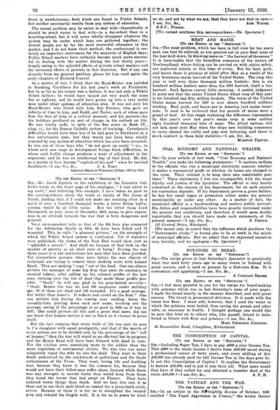[To THE EDITOR or THE " SPECTATOR."]
Sia,—Mr. Jacob Epstein in his exhibition at the Leicester Gal- leries wrote on the front page of his catalogue, "I rest silent in mg work," and following this example, I have taken no part in the correspondence about the truth or falsity of The Loom of Youth, holding that if I could not make my meaning clear in a novel of over a hundred thousand words, a letter filling half-a- column would be of little value. But the letter from Lord Dartmouth in your issue of December 29th seems to give expres- sion to an attitude towards the war that is both dangerous and general.
Your correspondent tells us that of the 384 boys who competed for the Ashburton Shield in 1914, 66 have been killed and 79 -wounded. This he calls "a pleasant picture," on the strength of which the Public School system is vindicated. Yet if statistics were published, the slums of the East End would show just as " splendid a record." And shall we because of that look on the squalor of poverty as an ideal state of being? During the last three years it is not institutions but men that have been justified. Yet everywhere systems (that were before the war objects of criticism) are trying to cement their shaking walls with human blood. They are making " copy " out of the dead. One can almost picture the manager of some big firm that owes its existence to sweated labour, after adding up the colossal profits of the last year, turning over the list of dead that made those profits pos- sible. " Good," he will say, glad in his grey-haired security- " Good. Before the war we had 509 employees under military age; 76 of them are dead and 143 wounded. It's a good average. Far better than Jones's. It reflects real credit on the firm." One can picture him during the coming year reading down the casualty-lists, putting down each new name, working out the average, seeing if the percentage is as good in 1918 as it was in 1917. One could picture all this and a great deal more, did not one know that human nature is not as black as it chooses to paint itself.
But the fact remains that every walk of life has sent its eons to Vie slaughter with equal prodigality, and that if the merits of every system are to be decided only by the percentage of its " roll of honour," then the war will stand as an effectual bar to progress and the Menin Road will have been littered with dead in vain. For the civilian owes something more to the soldier than the mere repetition of sentimental clichés. We who live can never adequately repay the debt we owe the dead. They went to their death undeceived by the catchwords of politicians and the facile enthusiasms of the Press. They went, loving life and loathing war, because they knew it was the common lot, because they would not have their fellow-men suffer alone, because while there was any strength in mortal limbs they would keep from those they loved the terror that had swept on France. They have endured worse things than death. And we that live owe it to them not to use their spilt blood as cement for a jerry-built civili- zation. Because of them it is for us to straighten the twisted prop and rebuild the fragile wall. It is for us to prove by what we do, and not by what we say, that they have not died in vain.— [We cannot continue this correspondence.—En. Spectator.]


























 Previous page
Previous page